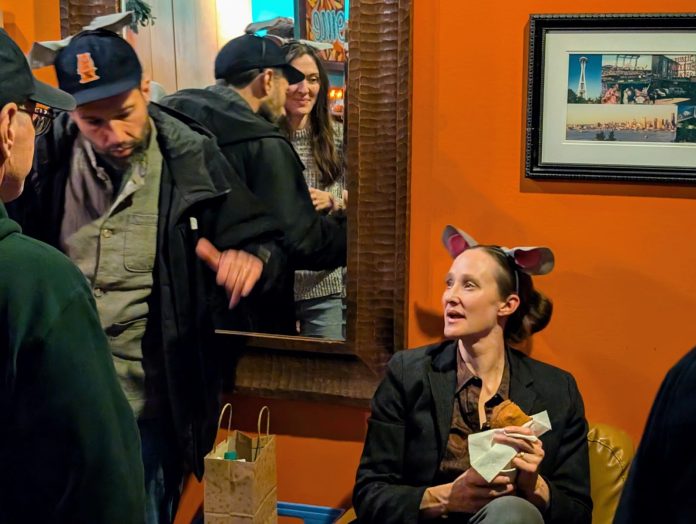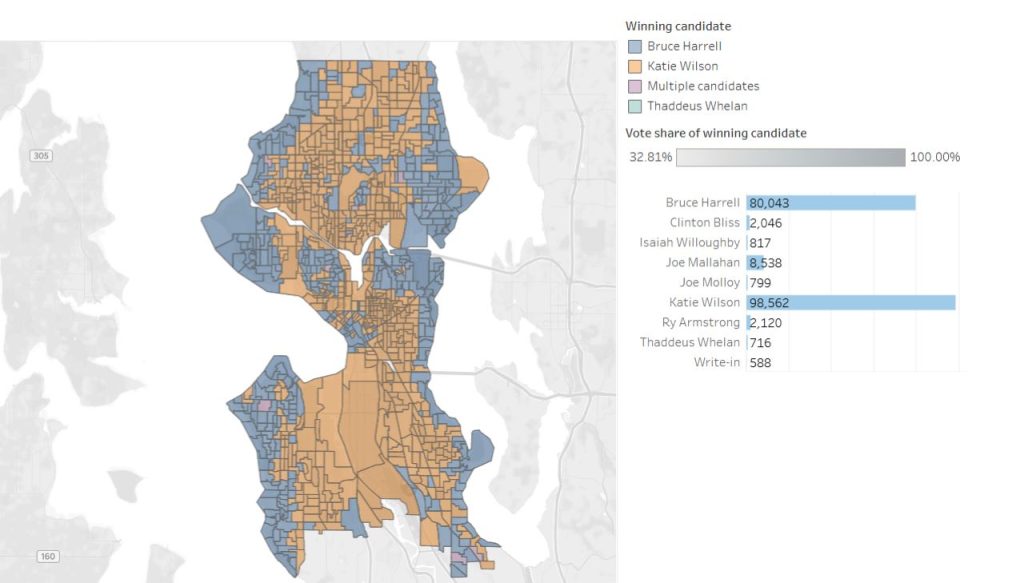
In a Friday campaign event, Seattle mayoral candidate Katie Wilson harkened back to her younger street-musician days when she used to busk at Pike Place Market. Wilson told a gathering of Market workers and community members that she understood their struggles; she has lived them, and Seattle’s mayoral frontrunner told them she is fighting for the little guy.
Emily Pike, who works at a bookstore in the market and helped organize the event, said Wilson’s story resonates with them, and connects with the spirit of Pike Place Market, a tight-knit community of laborers, independent local merchants, and Market advocates.
“There’s a kind of camaraderie that you feel when you spend your days down here,” Pike said. “Because every day in the market, you see neighbors helping neighbors. You see neighbors looking up for each other and supporting each other. It’s the community; it’s the people that make the market special.”
Pike Place Market workers call themselves “market rats” — a nod to the humble professions they ply and their sense of resilience and belonging in the alleys of the market.
“That ethos of communal resilience through communal caretaking is embodied in the work that Katie does and the way that she does it, the way that she leads,” Pike said. “Which is why I trust that when Katie Wilson’s mayor she not going to fight for a handful of millionaires and corporate interests; she’s gonna fight for us little rats.”
Last night, at Candidate Survivor, I had the opportunity to break out some very rusty harmonica skills. See, campaigning is fun. Campaigning is fun? Campaigning is fun.
— Katie Wilson for Seattle (@wilsonforseattle.bsky.social) July 25, 2025 at 10:47 AM
[image or embed]
Sticking with a message that propelled her to an upset win over big-business-backed incumbent Bruce Harrell in the primary election, Wilson said Seattle must become a more affordable place to live.
“The city is so hard to afford, and the fact is, like, Seattle should be a city where you can busk at Pike Place Market and afford to live here,” Wilson said. “What we lose when it becomes this kind of pressure cooker, where you have to have a tech job in order to survive, is so profound, right? It becomes a city that’s more sterile. It becomes a city that’s more alienated. We lose that community. We lose that feeling of just like you can be here. This is your home. And what I want more than anything as mayor is to make the city into a place where we can all live. This is all of our home. And that’s not going to be easy, right? That’s not going to happen overnight, but I really believe that we can make progress.”
That message also won over The Urbanist elections committee, who enthusiastically endorsed her. (Disclosure: I am on that 14-member committee.)
Former mayoral candidate Cary Moon was among the rally attendees. Moon lives next door to the Market and long advocated for a people-centered waterfront, arguing a highway tunnel and car-choked surface-level boulevard was not necessary as Seattle tore down the Alaskan Way Viaduct. Moon lost her mayoral bid, as Jenny Durkan instead prevailed in 2017.
Moon said she saw some familiar themes, as Harrell and his centrist allies sought to portray their progressive opponent as a lightweight without enough relevant experience.
“The punching down sexism is so ugly,” Moon said. “I hope the voters see through that, because Katie is fantastic, and she’s brilliant, and she’ll surround herself by good people, and she will do a great job.”
The Seattle old guard’s dismissive, condescending attitude toward Wilson, a progressive woman from an organizer background, was encapsulated in the campaign mailer that the pro-Harrell political action committee (PAC) sent out this month, and the expensive television ad it ran during Mariners playoff games. Run by Senior Deputy Mayor Tim Burgess — Harrell’s right-hand man and political attack dog, the PAC has raised more than $1.6 million from bigwigs from big business and real estate — many from outside the city.
The labor union PROTEC 17 and other progressives launched their our PAC, Katie Wilson for an Affordable Seattle, to try to counter that spending. However, Harrell’s business-backed PAC has raised at least four times more, raising more from Medina (the ultra-wealthy tiny suburb across Lake Washington) than the pro-Wilson PAC has overall. That fundraising advantage has bought an advantage in advertising reach.
The pro-Harrell mailer featured what apparently is a decade-old résumé that Wilson submitted to the City for an application to an advisory board. The TV ad included clips of Harrell badgering Wilson about her purported lack of management experience during a debate aired on Seattle Channel.
The sneering derision that Wilson had worked a smattering of low-paying jobs (rather than efficiently climbing the corporate ladder like Harrell) dripped through both campaign communications. But to many Seattleites, like the market rats who threw her a rally, Wilson’s varied experience is more relatable and resonant than Harrell’s corporate pedigree.
Around the time Wilson was busking in the Market to make rent, Harrell was buying a 7,000-square-foot mansion next to Seward Park for $1.4 million. As Seattle’s housing crisis has festered throughout Harrell’s two-decade career in politics, the value of his home has jumped above $4 million — appreciating at twice the rate of inflation.

A growing majority of Seattleites (if not odd-year voters) are renters, unfamiliar with the comforts of owning a million-dollar home. Wilson’s primary win indicates voters have grown disillusioned with leaders who haven’t lived their struggles or grappled with Seattle’s affordability crisis firsthand in a very long time — and who have been pushing failed policies for decades.
While Harrell’s attack ads were right that Wilson hasn’t personally managed million-dollar budgets through her work or personal finances, she was instrumental in passing the largest progressive tax reform in modern Seattle history, leading a coalition that passed the JumpStart progressive payroll tax on large companies in 2020.
That victory shifted more of Seattle’s tax burden away from overtaxed working families and toward big businesses, raising hundreds of millions in annual revenue that spared the city from deep program cuts in the midst of the Covid pandemic. It also provided a major new funding source for affordable housing — at least the portion that was not swiped by Harrell to fill holes in his budget.
Wilson also fought and won campaigns to raise the minimum wage, improve transit service, and make transit more affordable to workers and poor residents. To many, that body of work would seem relevant mayoral experience.
Seattle’s next mayor will be tasked with keeping diverse coalitions together, setting a bold agenda, assembling highly-capable teams, and motivating action toward a positive vision of Seattle’s future. Looking back on Harrell’s time in office, his record is mixed on those fronts, with some concerning red flags. On the other hand, that is the kind of leadership that Wilson has demonstrated time and again.
Doug Trumm is publisher of The Urbanist. An Urbanist writer since 2015, he dreams of pedestrian streets, bus lanes, and a mass-timber building spree to end our housing crisis. He graduated from the Evans School of Public Policy and Governance at the University of Washington in 2019. He lives in Seattle's Fremont neighborhood and loves to explore the city by foot and by bike.

